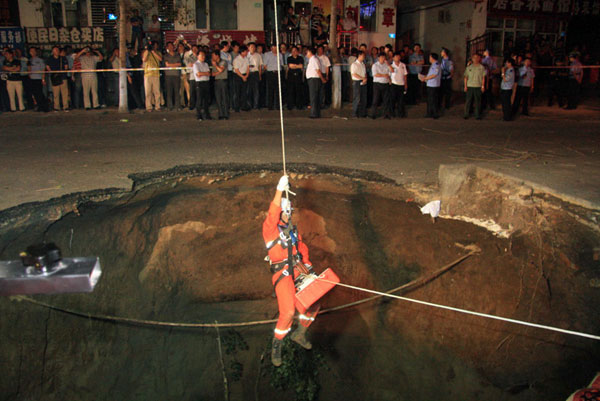
After a series of sidewalk collapses across China, urban-planning experts are urging authorities to improve their management of underground-pipe networks by demanding detailed plans before giving a go-ahead to dig up a road or sidewalk.
 |
|
A firefighter in Harbin, capital of Northeast China's Heilongjiang province, goes down into a sinkhole to rescue people who fell into it after the pavement collapsed on Tuesday. Two people were killed and two were injured. Xiao Jinbiao / for China Daily |
Although rare, such incidents have been fatal, and experts say that officials must make sustainable underground construction a key factor on the nation's rapid and ongoing urbanization drive.
Jiang Zhongguang, a professor of urban planning at Beijing University of Civil Engineering and Architecture, said that one priority has to be requiring companies to put all utility pipes and cables in one large tube, rather than allowing each company to dig and plant at will, as is now the case.
"At the moment, only main roads or streets in some large cities have such tubes underground, as they require authorities to spend a lot of money," Jiang said. "If a water pipe is buried directly in the soil and then breaks, it is more likely to erode the ground and make the area more dangerous."
The integrated tube is expensive and currently not required, so public utility departments will do construction in cheaper ways, he said.
"The underground construction should catch up with developments on the ground. In other words, the ground has to be dug again and again to support the changes above, which lead to looser soil," Jiang said, adding that the fragile ground will more likely collapse in bad weather or under pressure.
Peng Fei, deputy general manager of Dalian Metro in Liaoning province, said governments should record the underground work and have a comprehensive plan before construction.
"Such a file can record underground structures," he said, adding that the information would be helpful for maintenance.
He also suggested workers fill holes thoroughly to shorten gaps and make a long-term plan so that it's not necessary to dig up the ground again and again.
"The authorities can't be stingy in investing in underground infrastructure," he added.
On Tuesday afternoon, four people fell through collapsed pavement in Harbin, capital of Heilongjiang province, killing two of them and injuring the two others, according to a statement from the city's Nangang district government.
Authorities evacuated 1,030 residents around the collapsed pavement in Liaoyang Street after the disaster and called on drainage company and gas provider to investigate, the statement said.
"I heard a dull thud outside that afternoon and then saw a big hole on the street," said Zhang Zhengquan, 52, who runs a supermarket opposite the accident scene. "I was frightened at that time and called my family to escape from here."
Residents were asked to close electricity and gas switches, while some did not return home until Wednesday afternoon, Zhang said.
On the same day, a similar accident also occurred in Dalian.
An 18-year-old man, who will be a university student, was scalded on about 65 percent of his body after dropping into a hole caused by a collapsed pavement on Zhongshan Road. He is receiving medical treatment and is in stable condition.
The accident scene, which is 200 meters from a subway construction site, has been covered with sandy soils now.
"The site of the incident was often steaming before the tragedy, but no one repaired it," a resident surnamed Wang said.
The causes of the two collapses are under investigation.
In addition, Beijing has been affected by similar collapses after persistent rains, especially after the record downpour of July 21.
Contact the writers at [email protected], [email protected] and [email protected]







